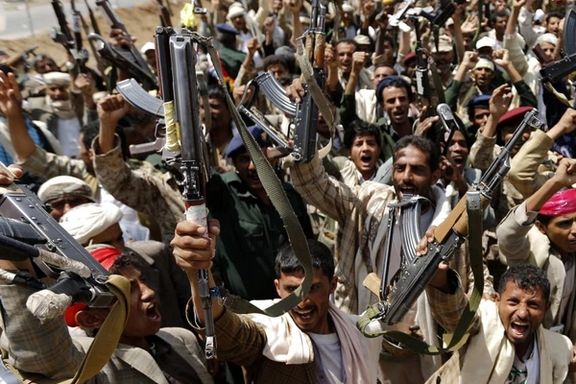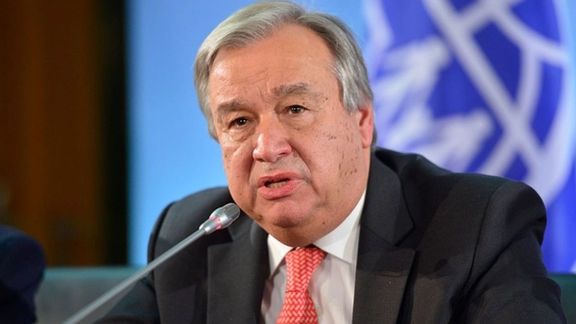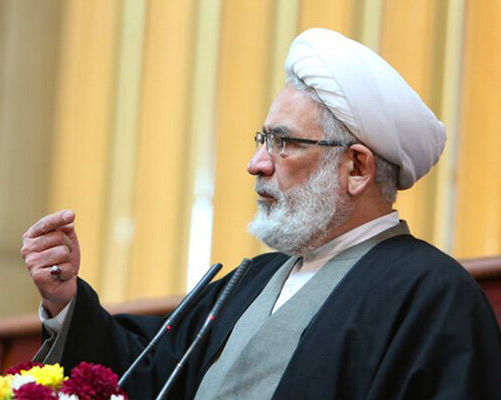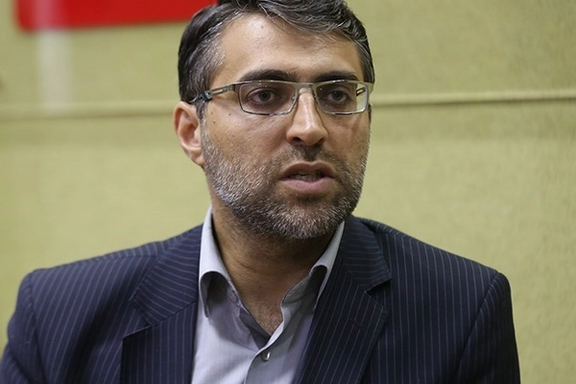US Envoy Calls Yemen Truce Chance For Iran To Show Goodwill

US Special Envoy for Yemen says the two-month truce between a Saudi-led coalition and the Iran-backed Houthis is an opportunity for the Islamic Republic to show its goodwill.

US Special Envoy for Yemen says the two-month truce between a Saudi-led coalition and the Iran-backed Houthis is an opportunity for the Islamic Republic to show its goodwill.
In an interview in Amman on Saturday, Tim Lenderking called the UN-brokered ceasefire a "decisive moment" in the near seven-year conflict and can serve as a first step" to a permanent peace.
"We would like to see Iran move away from the negative tactics and role they have played up this point," he said, adding that “If the international community and parties can work together this could be built into a lasting ceasefire and inclusive political process that ultimately gives shape to a new Yemen".
Iran has also welcomed the breakthrough as the warring sides in Yemen's conflict have agreed to a two-month nationwide truce.
It is reasonable to assume that without Tehran’s agreement the Houthis would not have accepted a ceasefire with Riyadh since the Yemeni conflict is widely seen in the region as a proxy war between Saudi Arabia and Iran.
The United States and others have criticized Iran for supplying missiles, drones and other weapons to the Houthis as part of its drive for regional influence and attempts to weaken Saudi Arabia. At the same time, Tehran is asking Washington to lift sanctions imposed on its Revolutionary Guard that is managing proxy forces in the Middle East.

UN Secretary General Antonio Guterres called Iran’s Foreign Minister Hossein Amir-Abdollahian to congratulate Yemen’s ceasefire and discuss talks to revive the 2015 nuclear deal.
Guterres was quoted by the government news website IRNA as saying that the two-month ceasefire announced for Yemen on Friday “a mutual success”, achieved through efforts by all involved parties.
Amir-Abdollahian in turn thanked Guterres for his role and insisted that now is the time to take “fundamental steps” toward peace and stability in Yemen, specially removing sanctions that impact humanitarian aid.
Referring to a Security Council resolution condemning aggression by the Houthi rebels, Iran’s foreign minister expressed his disappointment. Tehran has been supporting the Houthis who have been fighting Yemen’s legitimate government and a coalition led by Saudi Arabia that has intervened in Yemen since 2015.
Speaking about nuclear negotiations with world powers in Vienna, Amir-Abdollahian told Guterres that “we are close to an agreement and have submitted our proposals over remaining issues through the European Union’s negotiator to the American side and now the ball is in their court.”
After one year of indirect negotiations with Washington, Tehran’s last major demand is for the US to remove the Revolutionary Guard from its foreign terrorist list. The Biden administration has not made a decision yet on the issue as opposition to such a move has been gaining ground among American lawmakers.

Iran's envoy to Copenhagen has "strongly protested" to the use of violence against an Iranian political asylum-seeker in Denmark, who was forcibly deported.
In a Friday meeting with officials of Denmark's foreign ministry and ministry of immigration and integration, Afsaneh Nadipour conveyed Tehran's strong protest and called on the Danish authorities to apologize for the "inhumane behavior" against the Iranian asylum-seeker, punishment of the perpetrators of violence, and ensuring that similar incidents would not happen in the future.
"The Iranian ambassador's protest to Denmark is ridiculous," the family's translator in Denmark, Reza Asoudeh, told Iran International TV on Saturday, adding that in his view it is the government of the Islamic Republic that must apologize for making it impossible for this family to live in their own country and driving them to seek political asylum elsewhere.
Danish immigration authorities on Tuesday tried to deport Ghadamkheir Haghanizadeh, 37, and her two ten-year-old sons, Yousef and Younes back to Iran. Danish authorities rejected the political asylum application of Ghadamkheir and her two sons in 2017.
In the early hours of Monday, four Danish deportation agents dragged Ghadamkheir, a refugee from Iran's western province of Kermanshah, out of one of Denmark's refugee camps where she had been living for six years.

A video recorded by a resident of the camp where Ghadamkheir and her family lived appeared on social media that suggests Danish deportation agents used unnecessary violence against her. She was then shipped off to the airport with her two sons to be sent back to Iran through Istanbul, Turkey.
When in Istanbul, Ghadamkheir resisted boarding a flight to Iran and according to Kurdistan Human Rights Network injured herself in what could have been suicide attempt. She was returned to Denmark a few hours later where she is receiving medical treatment at a hospital now.
The family of five have sought refuge in Denmark since mid-2010s but her asylum request was rejected while the husband and a younger child are still living in Denmark.
After forcibly separating Ghadamkheir and her two older sons from her husband, Sirus, and their younger child, Danish authorities contacted her husband, and gave him two options: to either accept repatriation money and return to Iran, or to never see his wife and children again, Rudaw, a news agency in Iraqi Kurdistan claimed Friday.
According to Rudaw, Sirus who is currently held at a location close to the camp where they lived with the couple's infant son and the two older boys after their return from Istanbul.
Rudaw said Sirus entered Denmark illegally after travelling through several countries in 2015 to seek political asylum, while his wife and two sons entered the country legally and then requested asylum. Since she did not break Iranian law by travelling without a passport, she can return, Danish authorities say.
The couple's one-year-old baby was born in Denmark which explains why he was not deported with the mother.
The Iranian intelligence ministry arrested Sirus, a blacksmith in Kermanshah province, in 2014 on suspicion of having ties with the outlawed Kurdistan Democratic Party of Iran (KDPI) and his father had been hanged in 1984 for the same reason, while Ghadamkheir's father, an active member of the party, was shot dead by security forces in 1985.
“Due to the fact that our fathers were members of the party, they would blame us whenever something happened in the area,” Sirus told Rudaw. The family belongs to the Yarsani religious minority whose followers are discriminated against in Islamic Iran.

Iran’s prosecutor-general has called on the police to challenge those eating and drinking in their cars during daylight in the fasting month of Ramadan.
In a letter to the police commander-in-chief Hossein Ashtari, Mohammad Jafar Montazeri pointed out that vehicles are not private property, meaning that any eating and drinking inside cars in public places should not take place.
Ramadan fasting begins Sunday in Iran. It started Saturday, as expected, in Saudi Arabia, once the Ramadan crescent moon was confirmed Friday. The United Arab Emirates and Kuwait also declared Saturday as the first day of the lunar month.
Montazeri stressed that prosecutors across Iran should cooperate with, and support the police, in following holy month’s rituals and regulations. Foreign minister Hossein Amir-Abdollahian tweeted a wish that the holy month bring “mercy…to us and all peoples with goodness, tranquility and abundance.”
Fewer people have been observing the Muslim fasting period in recent years but police arrest and fine anyone who breaks the rules in public.
In addition to avoiding certain actions mentioned in the Qur'an, Muslims must abstain from food or drink of any kind from dawn to dusk, which will be about 14 hours in Iran this year.
Every year police enforce a national plan to deal with those who break Ramadan rules in public, and transgressors are sometimes sentenced to months of detention and lashes.

There can be no doubt about President Joe Biden’s commitment to the defense of partners in the Middle East, National Security Advisor Jake Sullivan has said.
In a statement released on Friday by the White House, Sullivan mentioned that as Ramadan approaches, “We welcome the proactive diplomacy underway with our friends and partners across the Middle East region.” He added that these efforts help “President Biden’s agenda of forging a more secure and integrated Middle East region through a combination of deterrence against adversaries and diplomacy wherever possible…”
Sullivan went on to praise the summit held earlier in the week between the United Arab Emirates, Israel, Bahrain and Egypt with the participation of US Secretary of State Antony Blinken, saying the plan is to expand this circle of partners.
He also mentioned sanctions designation this week against a procurement network for Iran’s missile program, adding that “We will continue to use all appropriate authorities to hold Iran and its proxy groups accountable for threats against our friends and partners.”
The statement also highlighted terror attacks in Israel and said, “President Biden spoke with Prime Minister Bennett on Wednesday and offered all appropriate assistance in the wake of these barbarous attacks against innocent civilian. Our entire administration stand behind our Israeli allies as they work to confront threats to their citizens.”

The general director of a major government pension fund in Iran says that around $400 million was lost either through mismanagement or embezzlement.
The official government news agency, IRNA, quoted Hossein Amerian, the newly appointed general director of steel industry pension fund that there are 800 investigations taking place to identify all those who are responsible for the losses.
The fund makes retirement payments to tens of thousands of people who worked both at government-owned and privatized steel companies. When the pension fund loses money, the government must step in and fill the deficit in addition to paying pensions of millions of former government employees such as teachers.
Because of the current economic crisis, triggered mainly by US economic sanctions since 2018, the government has been unable to regularly dispense the monthly pensions or adequately increase payments amid a 40-percent annual inflation rate.
Amerian explained that fund managers in the previous government of president Hassan Rouhani invested in money-losing government companies or simply engaged in corrupt practices that cost the pension fund 100 trillion Iranian rials or $400 million.
Officials appointed by President Ebrahim Raisi in recent months have claimed many cases of corruption by former managers, but it is not clear to what extent these are politically motivated. There have also been allegations of nepotism in the new administration, where newly appointed officials want to fire thousands of managers to appoint their own friends and relatives to lucrative posts.